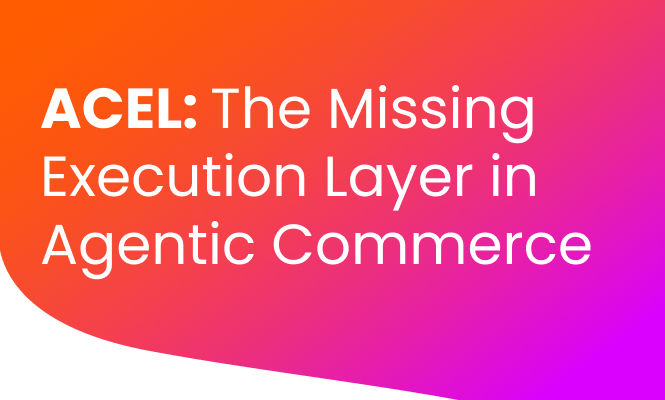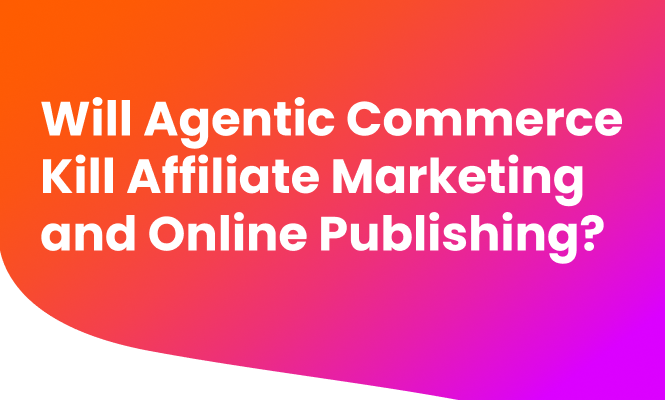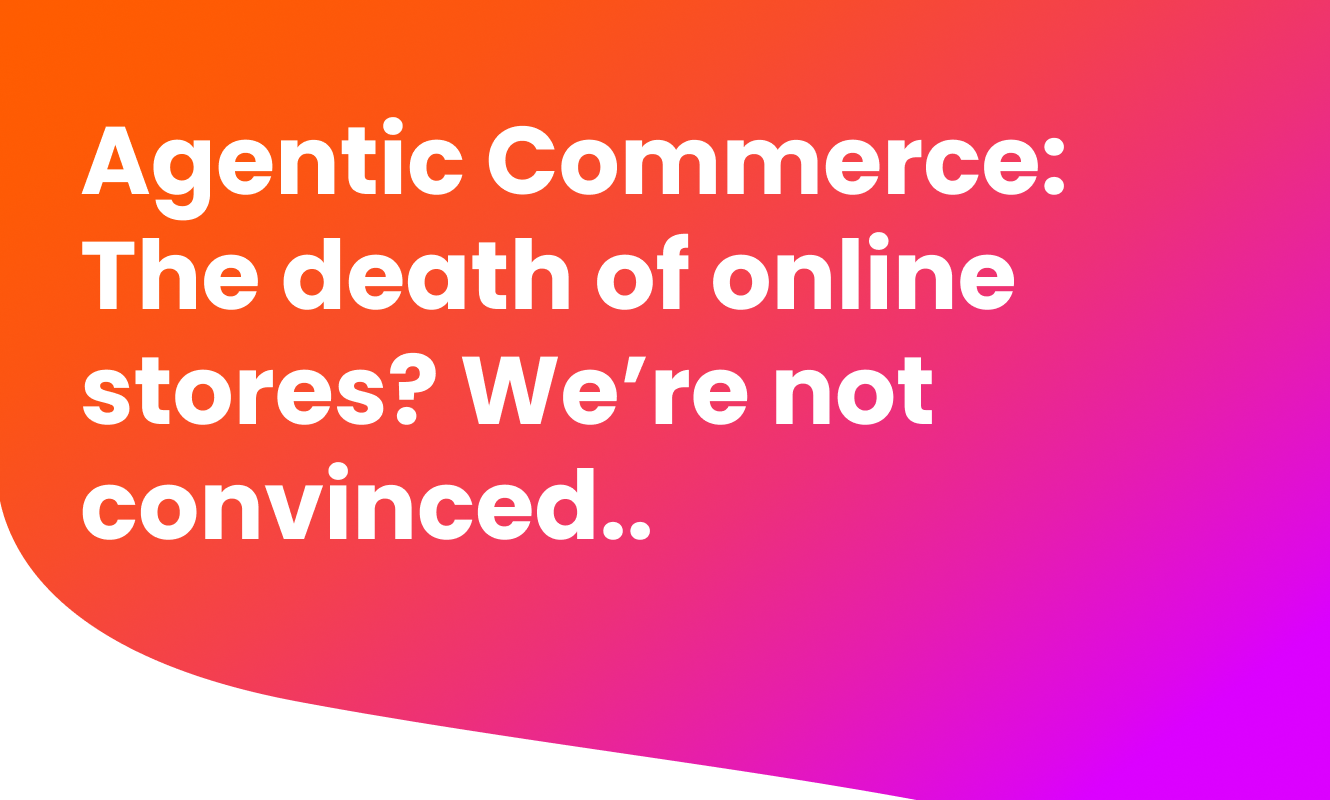 https://shopthru.com/wp-content/uploads/2026/02/ACEL.png
400
665
Matt Parkinson
https://shopthru.com/wp-content/uploads/2025/05/shopthru-logo-colour.png
Matt Parkinson2026-02-24 09:58:002026-02-24 10:00:50ACEL: The Missing Execution Layer in Agentic Commerce
https://shopthru.com/wp-content/uploads/2026/02/ACEL.png
400
665
Matt Parkinson
https://shopthru.com/wp-content/uploads/2025/05/shopthru-logo-colour.png
Matt Parkinson2026-02-24 09:58:002026-02-24 10:00:50ACEL: The Missing Execution Layer in Agentic CommerceAgent Payments Protocol (AP2) Is a Milestone
Read time: 2 mins
We’ve been watching and reading for some time all the chatter and noise about Agentic Commerce. Lots of hype, promise and dare I say vapourware. The launch of the Agent Payments Protocol (AP2) by PayPal and Google marks a pivotal moment for the future of commerce. We’re encouraged to see industry leaders like PayPal and Google not only defining AP2, but also committing to it as an open standard, something Google has rightly acknowledged is essential if the community is going to make this fly.
This is a huge step forward. Agentic commerce, where intelligent agents discover, recommend, and even purchase products, will only succeed if the payments industry builds the right infrastructure for trust, security, and interoperability. AP2 is a major milestone on that journey. Prakhar Mehrotra, PayPal’s Head of AI, has written an excellent piece on Agent Payments Protocol: Building Verifiable Trust for Agentic Commerce, and Google has shared their perspective in Announcing Agents to Payments (AP2) Protocol.
But payments alone won’t get us there. For agentic commerce to really thrive, three things must happen…
1. The Payments Industry Must Build the Infrastructure
Security, trust, and interoperability are non-negotiable. Consumers need confidence that AI-driven transactions are safe, private, and universally accepted. The work PayPal, Google, and others are doing on AP2 is laying a much needed foundation. Without this layer, agentic commerce cannot scale.
For decades, ecommerce has borrowed from the physical world rather than designing for the digital one. The basket/cart is just a metaphor for a shopping trolley. Online checkout flows are modelled on the in-store POS. Even payments themselves have largely been a digital skin over analogue processes.
But agentic commerce is an opportunity to change that. For the first time, we’re not retrofitting the real world into a digital one, we’re architecting commerce for a digital-first environment. The Agent Payments Protocol seems to be the right first step, enabling transactions to be initiated and completed in ways that only make sense in a world of AI, agents, and distributed discovery.
2. Consumer Behavior Must Adapt
Even with the infrastructure in place, adoption depends on consumers trusting AI agents to act on their behalf. That’s a cultural and behavioral shift. Do people even want or need this? It will take time, education, and proven value before people are comfortable letting “agents” manage their shopping, subscriptions, or payments.
But trust isn’t just about secure payments, it’s also about the integrity of product discovery. When an agent recommends a product, consumers will want to know: is this authentic? Is the review genuine, or just another AI-generated placement? Where is the information coming from? Who benefits from that recommendation?
If this isn’t addressed, we risk sleepwalking into a self-fulfilling economy where the products surfaced aren’t the best or most relevant, but simply the ones backed by whoever paid the most to the model or agent. That erodes trust at its core.
For agentic commerce to work, consumers need confidence that recommendations are grounded in real influence and authentic content and that the people creating that influence are being compensated fairly. Without that, agents risk becoming just another advertising channel, not a trusted shopping companion.
3. The Commercial Model Must Be Fixed
This is where the current system is breaking and where Shopthru comes in.
Right now, the affiliate attribution model is fundamentally flawed because it’s underpinned by redirection-based tracking. Every click is routed through layers of tracking mechanisms that were never designed to be robust, transparent, or fraud-proof. Despite all the genuine and well-intentioned efforts to build confidence into the system, it remains open to abuse and manipulation. Content creators, publishers, and genuine influencers often drive the real discovery and demand, yet their contribution is undermined by a tracking infrastructure that simply can’t guarantee fairness or accuracy.Attribution leakage drains billions from merchants and undermines the very ecosystem that agentic commerce needs to thrive.
If we don’t solve this, agentic commerce risks becoming an existential threat to publishers and creators. Why? Because AI-driven discovery will only accelerate consumer fragmentation. If the pipes that connect influence to attribution remain broken, the very people creating value — journalists, creators, communities — will lose out, and the system collapses.
The Challenges Ahead for AP2
For the Agent Payments Protocol to really take off, PayPal and Google have a few big hurdles to clear. The first is security, if agents are going to start spending on our behalf, the system needs to be watertight. Nobody’s going to hand the keys to their wallet to an AI if there’s even a hint of spoofing, fraud, or dodgy authorisations creeping in. That links directly to trust. Consumers will only adopt this if it feels safe, transparent, and if they stay in control. One bad experience early on could spook the whole market.
Then there’s the challenge of scale. Payments can’t live in a Google + PayPal bubble — AP2 needs to become a standard that everyone can plug into, or we’ll end up with silos that never reach critical mass. Layer onto that the regulatory headaches (liability, refunds, KYC, consumer protection) and you can see why this isn’t a simple “switch it on and go” moment.
But perhaps the thorniest issue is commercial. Who gets rewarded in a world where agents do the shopping? The current affiliate model is already broken, with publishers and creators losing out to hijackers, and agentic commerce could make that problem even worse. Without fixing attribution and the economics around influence, we risk building the future of commerce on shaky ground. That’s exactly where Shopthru comes in: solving the plumbing of attribution so the whole ecosystem can actually thrive.
Shopthru: Building the Missing Plumbing for Agentic Commerce
At Shopthru, we’re solving this problem head-on. Our embedded storefront and checkout infrastructure ensures that attribution is secure, transparent, and accurate at the point of purchase: no leakage, no hijacking, no fraud.
We’re effectively building the plumbing for distributed and agentic commerce, ensuring that when AI agents drive discovery and recommendation, the right creators and publishers are rewarded fairly and instantly.
- Merchants grow profitably, without wasted margin.
- Publishers and creators are incentivized to keep producing authentic content.
- Consumers benefit from seamless, native checkout experiences anywhere.
The Bigger Picture
Agentic commerce has enormous potential, but it can’t succeed if only the payments side evolves. Infrastructure, behavior, and commercial incentives must move together.
Payments innovation like AP2 is the critical first step. But unless we fix attribution and reward authentic influence, agentic commerce will be built on shaky ground.
That’s why Shopthru exists: to make sure the future of commerce is not just agentic, but also sustainable, transparent, and fair.
Because the future isn’t just about agents buying things. It’s about building an ecosystem where everyone who creates value gets rewarded for it.




